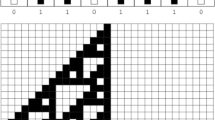Abstract
We describe some experimental results within a scenario in a simulation framework we are developing to enable experimentation of multi-agents behavior, measured by the total utility that agents can gather during a given time horizon. In this scenario the population of self-centered agents performs in an 80 × 80 grid with objects carrying information (infons) of varying utility that several autonomous agents are trying to obtain. This model is an abstraction for a real world information marketplace where agents simply cannot cooperate all the time for various practical reasons. The aim of this work is to show how we can validate the connection of agent local behavior to global behavior in various environmental situations.
Access this chapter
Tax calculation will be finalised at checkout
Purchases are for personal use only
Preview
Unable to display preview. Download preview PDF.
Similar content being viewed by others
References
Aaron A. Armstrong and Edmund H. Durfee. Mixing and memory: Emergent cooperation in an information marketplace. In Y. Demazeau, editor, Proceedings of the 3rd International Conference on Multi-Agent Systems (ICMAS-98), pages 34–41, Paris, France, July 1998. IEEE Computer Society Press.
John Bell and Zhisheng Huang. Dynamic obligation hierarchies. In P. MacNamara and H. Praken, editors, Proceedings of ΔEON’98, pages 127–142, 1998.
N. R. Jennings, K. Sycara, and M. Wooldridge. A roadmap of agent research. Autonomous Agents and Multi-Agent Systems, 1(1):7–38, 1998.
Victor R. Lesser. Reflections on the nature of multi-agent coordination framework and its implications for an agent architecture. Autonomous Agents and Multi-Agent Systems, 1(1):89–111, 1998.
M. Minar, R. Burkhart, C. Langton, and M. Askenazy. The Swarm simulation system: A toolkit for building multi-agent simulations. Technical report, Santa Fe Institute, 1996. http://www.santafe.edu/projects/swarm/.
David Poole. The independent choice logic for modelling multiple agents under uncertainty. Artificial Intelligence, 94(1–2):7–56, 1997.
Sendip Sen. Reciprocity: A foundational principle for promoting cooperative behavior among self-interested agents. In Proceedings of the 2nd International Conference on Multi-Agent Systems (ICMAS-96), pages 315–321, Kyoto, Japan, 1996.
R. Vincent, B. Horling, T. Wagner, and V. Lesser. Survivability simulator for multi-agent adaptive coordination. In P. Fishwick, D. Hill, and R. Smith, editors, International Conference on Web-Based Modeling and Simulation, pages 114–119, San Diego, CA, 1998.
Author information
Authors and Affiliations
Editor information
Editors and Affiliations
Rights and permissions
Copyright information
© 2000 Springer-Verlag Berlin Heidelberg
About this paper
Cite this paper
Letia, I.A., Craciun, F., Köpe, Z. (2000). Validating the Behavior of Self-Interested Agents in an Information Market Scenario. In: Leung, K.S., Chan, LW., Meng, H. (eds) Intelligent Data Engineering and Automated Learning — IDEAL 2000. Data Mining, Financial Engineering, and Intelligent Agents. IDEAL 2000. Lecture Notes in Computer Science, vol 1983. Springer, Berlin, Heidelberg. https://doi.org/10.1007/3-540-44491-2_57
Download citation
DOI: https://doi.org/10.1007/3-540-44491-2_57
Published:
Publisher Name: Springer, Berlin, Heidelberg
Print ISBN: 978-3-540-41450-6
Online ISBN: 978-3-540-44491-6
eBook Packages: Springer Book Archive




